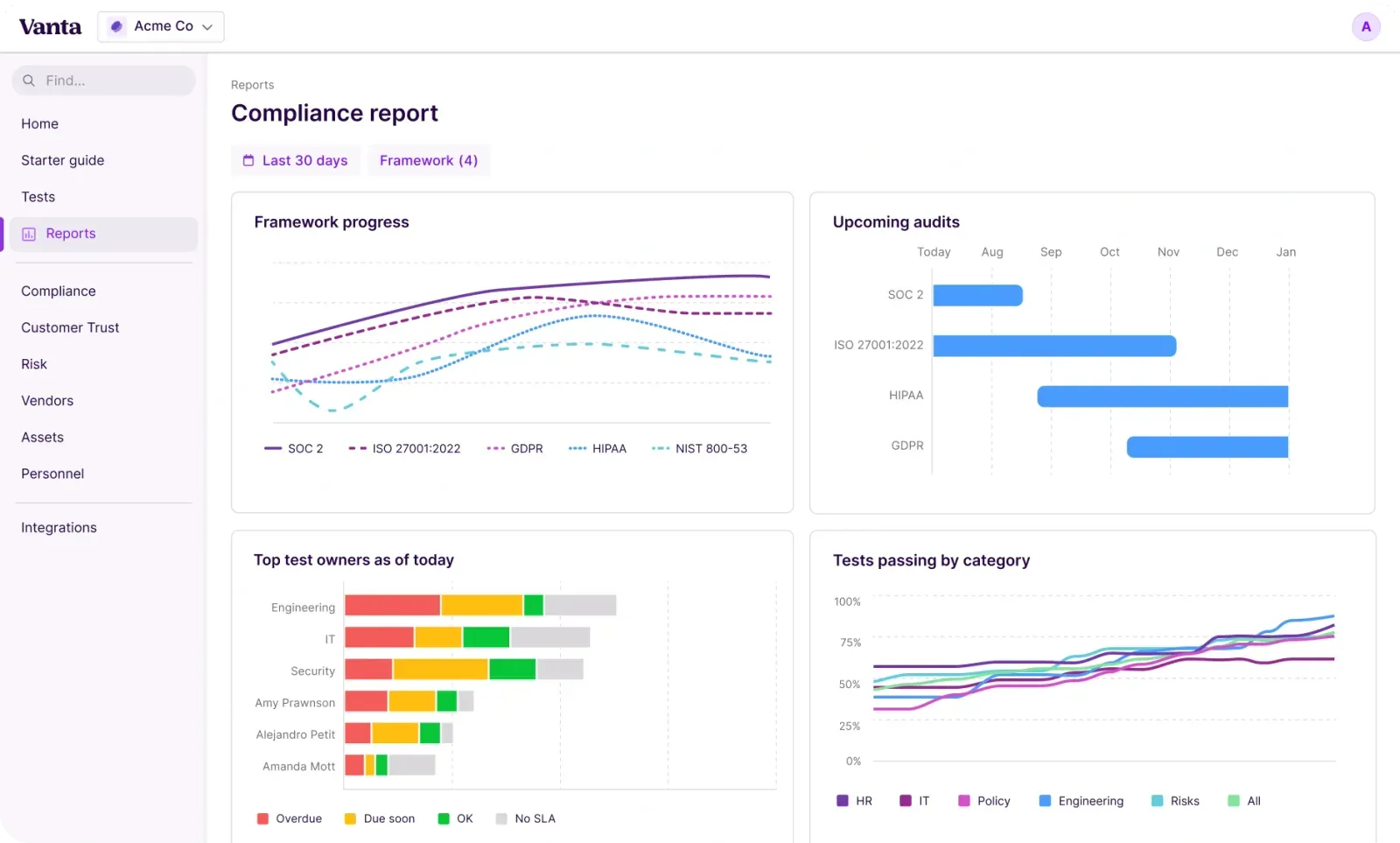
Vanta Raises $150M at $4.15B Valuation as Wellington Management Leads Series D Funding Round
Vanta Achieves $4.15B Valuation as Compliance Automation Crosses Critical Threshold
Wellington Management's $150M Bet Signals Enterprise Risk Management's AI-Driven Evolution
The cybersecurity compliance landscape witnessed a defining moment on July 23, 2025, as Vanta secured $150 million in Series D funding, catapulting its valuation to $4.15 billion—a striking 69% increase from its $2.45 billion valuation just twelve months prior. Wellington Management's leadership of this round, alongside strategic investments from CrowdStrike Ventures and Atlassian Ventures, represents more than capital deployment; it signals institutional recognition that compliance automation has evolved from administrative necessity to strategic competitive advantage.
This funding milestone arrives at an inflection point where regulatory complexity collides with technological capability. The European Union's NIS2 directive, the Digital Operational Resilience Act , and enhanced SEC cybersecurity disclosure rules have transformed compliance from periodic checkbox exercises into continuous operational imperatives. Organizations can no longer afford the luxury of point-in-time audits when threats evolve in real-time and regulatory oversight demands perpetual readiness.

The Anatomy of Exponential Growth in a Fragmented Market
Vanta's trajectory from its 2018 founding to today's $4.15 billion valuation illustrates the profound market forces reshaping enterprise risk management. The San Francisco-based company has accumulated $504 million in total funding while serving over 12,000 customers across 58 countries—a scale that reflects both the universal nature of compliance challenges and the effectiveness of Vanta's AI-powered approach to solving them.
The governance, risk, and compliance market presents a compelling growth narrative, with Grand View Research projecting expansion from $62.92 billion in 2024 to $72.42 billion by 2025, representing a robust 13.2% compound annual growth rate. The enterprise GRC segment alone commands $21.04 billion in 2025 value, with analysts forecasting 12.38% annual growth through 2030. These figures reflect more than market expansion; they capture the fundamental shift from reactive compliance to proactive risk management embedded in operational workflows.
Recent high-profile cybersecurity incidents involving Microsoft, Marks & Spencer, and Aflac have crystallized board-level understanding that security compliance represents both risk mitigation and business enablement. Organizations increasingly recognize that robust compliance frameworks accelerate sales cycles, enable partnerships, and create sustainable competitive advantages in trust-dependent markets.
Strategic Partnerships Redefine Competitive Moats
The participation of CrowdStrike Ventures and Atlassian Ventures in Vanta's Series D extends beyond financial investment into strategic alliance territory. CrowdStrike's involvement enables seamless integration between its Falcon security telemetry platform and Vanta's compliance automation environment, creating a data pipeline that transforms raw security intelligence into auditable compliance evidence.
This partnership model exemplifies how modern compliance platforms must evolve beyond standalone solutions toward integrated risk ecosystems. Customers can now pull CrowdStrike's endpoint detection data directly into Vanta's environment, enabling real-time security monitoring that satisfies auditor requirements while reducing manual evidence collection overhead. Such integrations create network effects that strengthen customer retention while raising barriers for competitors lacking comparable partnership depth.
Atlassian's strategic investment similarly reflects the convergence of development workflows and compliance requirements. As organizations embrace DevOps methodologies, compliance verification must embed seamlessly into continuous integration and deployment pipelines. Vanta's integration capabilities with Atlassian's ecosystem enable automated compliance checking throughout the software development lifecycle, ensuring that security controls remain effective as applications evolve.
AI Agents Transform Compliance Economics
Vanta's technological differentiation centers on its AI Agent capability, which automatically drafts 80% of security questionnaire responses with a 95% acceptance rate among customers. This automation addresses one of compliance's most time-intensive challenges: the repetitive documentation and evidence collection that historically consumed security teams' strategic capacity.
The platform continuously monitors over 200 million resources while generating more than 10 million Trust Center views, creating a comprehensive compliance fabric that extends beyond internal operations to customer-facing trust communication. These metrics suggest genuine platform adoption rather than superficial engagement, though deeper analysis of conversion rates and customer retention would strengthen the value proposition narrative.
Customer outcomes validate the AI-driven approach's effectiveness. Organizations report up to 526% return on investment over three years, with compliance teams experiencing 129% productivity improvements. Such metrics indicate that Vanta's platform transcends cost reduction to enable strategic capability expansion, allowing security professionals to focus on risk strategy rather than administrative tasks.
Competitive Dynamics Shape Market Consolidation
The compliance automation landscape reveals stark differentiation in funding scale, customer reach, and strategic positioning. Drata, with $328 million raised across multiple rounds and a $2 billion valuation, offers comparable audit automation capabilities but lacks Vanta's advanced AI agent features. OneTrust commands broader trust intelligence functionality with $926.4 million in funding, $500 million in annual recurring revenue, and relationships with 75% of Fortune 100 companies, though its $5.1 billion valuation reflects slower growth dynamics.
Smaller competitors face capital constraints that limit innovation velocity. Hyperproof's $40 million Series B funding supports enterprise clients but provides insufficient resources for comprehensive AI development. Secureframe's $79 million total funding enables rapid SOC 2 automation through extensive integrations but constrains its ability to compete on advanced features against better-capitalized rivals.
AuditBoard's $3 billion acquisition by Hg Capital in 2024 demonstrates how private equity views the compliance market's consolidation potential. With $200 million in annual recurring revenue and penetration into 50% of Fortune 500 companies, AuditBoard's internal audit focus positions it differently from Vanta's security compliance specialization, suggesting market segmentation rather than direct competition.
Investment Implications Navigate Multiple Compression Risks
Vanta's 18.9x revenue multiple reflects investor confidence in sustained growth but also highlights valuation vulnerability as the company approaches public market scale. Comparable public companies including SailPoint, Tenable, and Workiva trade at 6-8x forward revenue multiples, suggesting significant multiple compression risks for late-stage compliance platforms.
The investment thesis hinges on Vanta's ability to expand beyond compliance automation into comprehensive risk operations. Market analysts suggest that successful migration into vendor risk management, third-party assessments, and continuous control monitoring could sustain premium valuations by expanding addressable market size and increasing customer lifetime value.
However, execution risks abound. Regulatory fragmentation requires continuous framework updates and localized compliance support, demanding substantial ongoing investment. Market consolidation pressures favor integrated suites over point solutions, potentially limiting Vanta's competitive positioning against comprehensive platforms like OneTrust or ServiceNow's governance modules.
Future Trajectory Balances Growth and Profitability
Vanta's expansion strategy emphasizes AI innovation, global market penetration, and enterprise segment development. The company plans to leverage new funding for advanced AI capabilities, international data center deployment, and specialized compliance solutions for heavily regulated sectors including government and healthcare.
The path to sustainable market leadership requires navigating several strategic challenges. Maintaining technological differentiation becomes increasingly difficult as competitors deploy comparable AI capabilities. Enterprise customer acquisition demands enhanced integration depth and workflow sophistication beyond current mid-market offerings. International expansion necessitates substantial investment in local regulatory expertise and data residency infrastructure.
Market dynamics suggest that successful compliance platforms must evolve into comprehensive risk management ecosystems. Organizations increasingly demand unified dashboards that integrate security compliance, vendor risk assessment, policy management, and audit coordination. Vanta's current specialization provides strong foundation capabilities but requires expansion into adjacent risk domains to maintain competitive relevance.
Investment Outlook Balances Opportunity with Execution Risk
The compliance automation market presents compelling growth fundamentals driven by regulatory complexity, cybersecurity threats, and operational efficiency demands. Vanta's market position, technological capabilities, and strategic partnerships create a foundation for continued expansion, though valuation levels reflect optimistic growth assumptions that require flawless execution.
Investors evaluating the compliance automation space should consider that market leadership may increasingly favor platforms capable of comprehensive risk management rather than specialized point solutions. While Vanta's current capabilities and growth trajectory support premium valuations, sustained success requires successful expansion into broader risk domains and enterprise market penetration.
The investment landscape suggests that the most asymmetric opportunities may exist in specialized infrastructure supporting compliance ecosystems rather than direct platform competition. Evidence integrity systems, model risk governance platforms, and vertical-specific compliance solutions represent areas where established incumbents must acquire rather than build capabilities.
Market analysts recommend that investors consider compliance automation investments as part of broader cybersecurity and enterprise software portfolios, recognizing both the sector's growth potential and its vulnerability to market consolidation and multiple compression dynamics.
Investment decisions should incorporate comprehensive due diligence and professional financial advice. Historical performance does not guarantee future results, and market conditions may significantly impact investment outcomes.